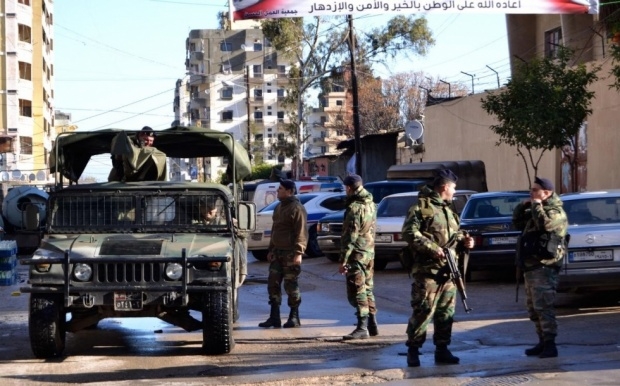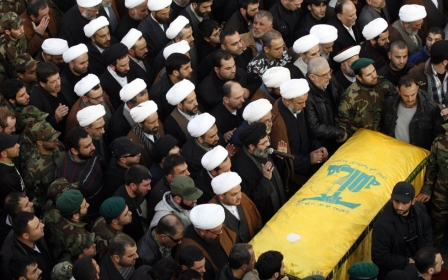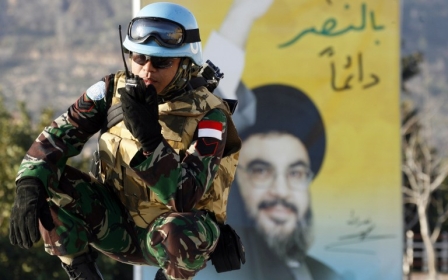The raid on Roumieh, Lebanon’s prison-state

The state of Lebanon is uniquely configured - or perhaps more appropriately, misconfigured - in such a way that its authority is easily eclipsed by that of more cohesive non-state entities.
Among the reasons for this is that the political sectarianism upon which the state is founded inevitably renders it schizophrenic in nature. The allocation of political and administrative posts on the basis of religion and the forced division of the population along sectarian lines naturally fosters an “us versus them” mentality and defies the formulation of policies on behalf of the general public good.
The situation is exacerbated by corrupt officials who encourage their constituencies to view politics and life as a zero-sum sectarian game, so as to maintain their own positions of privileged dominance.
As a result, the state finds itself incapable of performing simple tasks like electing a president - a post that has been vacant in Lebanon since last May.
The government’s inability and unwillingness to provide adequate services or fulfill responsibilities such as protecting the country from attack by Israel, meanwhile, means that other groups have stepped in to fill the gaps. Most notable among these is Hezbollah, regularly condemned by its detractors as a “state within a state.”
The same criticism was incidentally also levelled at the Palestine Liberation Organisation during its era of operations in Lebanon, which was brought to an end by the Jewish state - the entity most keen on thwarting both Palestinian statehood and state-within-a-statehood.
In more recent times, challenges to Lebanese state authority have emanated from the very institutions that are meant to epitomise state power and control: prisons.
And we’re not just talking about the fact that inmates have been known to check in on Facebook from their prison cells, posting photos of sushi spreads and other extravagant in-cell feasts.
Sunni Islamist prisoners have also exploited their internet and mobile phone connections to manage terrorist operations in Lebanon and Syria from behind bars.
An emirate within a prison
Until 12 January, a section of Lebanon’s notorious Roumieh prison north of Beirut had for many years existed under de facto Salafi-jihadist rule.
Contemporary estimates of the population of cellblock B put the figure at approximately 900, although the counting of inmates does not appear to be the prison staff’s forte; in 2012, the escape of three Islamist prisoners was reportedly discovered a month after the fact.
Block B was largely off-limits to prison guards, earning a reputation as a “mini-state” - or what some observers have aptly referred to as an “emirate”, comprising representatives of prominent jihadist groups like Fatah al-Islam, the Islamic State, and the al-Nusra Front.
Inside the compound, Sharia law was enforced to varying degrees, with punishments often meted out to uncooperative folks. Fatwas issued from within the prison walls were intended to govern the behaviour of followers both inside and out.
According to a 2012 investigation by journalist Radwan Mortada for Lebanon’s al-Akhbar newspaper, the Islamists of block B enjoyed “nearly unfettered freedom”, including access to weapons manufacturing equipment.
And despite the government’s investment of $650,000 in a mobile phone - and internet -jamming system, activating it proved to be another story entirely. The reluctance to do so had to do not only with the fact that jamming would then prohibit surveillance of the jihadists’ communications but also with the reality that cutting off said communications could result in violent reprisals outside.
But it seems you’re damned if you do, damned if you don’t. When on 10 January, a double suicide bombing killed nine civilians in the north Lebanese city of Tripoli, intercepted phone calls reportedly revealed that residents of block B had had a hand in the operation.
Two days later, Lebanese Interior Minister, Nohad Machnouk apparently decided the time was ripe for an intervention, and the Internal Security Forces (ISF) - Lebanon’s primary police force - raided the prison facility, confiscating electronics and other illicit items and transferring detainees to the better-monitored cellblock D. Inmates deemed to be of particular concern were placed in solitary confinement.
Although Machnouk claimed the raid was pulled off without a single inmate injury, this conflicts with testimony from some of the prisoners’ families, who allege that beatings and broken legs were involved. The latter version of events would be in keeping with the ISF’s modus operandi, which has been extensively documented in human rights reports on the torture and general mistreatment of police detainees in Lebanon.
Humanitarian rehabilitation?
In his 2012 article, Mortada quoted a Fatah al-Islam prisoner at Roumieh on the reasons for the preferential treatment of Islamists in block B: “There is a security and political faction which is pleased by [the Islamists’] behaviour.”
Indeed, the same institutionalised sectarianism that obviates the emergence of a functional state has also, obviously, influenced prison operations. In the case of the allegedly “pleased” faction referenced by the Fatah al-Islam inmate, this presumably included those Sunni politicians and other leaders who have endeavoured to exploit Sunni extremists as a counterweight to Hezbollah.
Of course, there’s always a limit to the utility of folks whose behaviour you can’t control.
As has been noted in various Lebanese media, the ISF’s descent upon block B auspiciously coincided with the recently launched dialogue between Hezbollah and the Future Movement led by Saad al-Hariri, the billionaire Sunni dynastic heir.
But just how probable is it that the raid will help resolve any of Lebanon’s issues - security or otherwise?
In the aftermath of the spectacle, Machnouk - himself a partisan of the Future Movement - declared that prison guards’ heads would henceforth be “cut off” if mobile phones were discovered inside cells. This was perhaps not the wisest choice of hyperbole in terms of cultivating an image of a sane and humane government dedicated to justice.
According to Machnouk’s calculations, the transferred inmates will be returned to block B between March and May of this year, once it has been “transformed into a humanitarian facility.” Public and private sector funds will assist in “rehabilitat[ing]” the vacated block.
Among the many problems with this vision, however, is that the spontaneous creation of a “humanitarian” prison in Lebanon would require a total revolution in government outlook and operating procedures, which just isn’t looking likely in the next 40 days.
Nor should the promise of private-capital-to-the-rescue elicit much enthusiasm, given the mutual exclusivity of the tradition of incarceration for profit and the goal of individual rehabilitation and human rights.
As the political editor of Lebanon’s al-Safir newspaper wrote in a recent article - translated by Al-Monitor - concerning the situation in severely overcrowded Lebanese prisons: “Services have been degraded… [and] ordinary inmates are being treated like subhumans as the private sector establishes its own presence and management structure.”
In the end, the makeover at Roumieh doesn’t stand a chance of altering business as usual in Lebanon, where jails will continue to serve as incubators for dangerous social pathologies that can be exploited by sectarian factions when politically expedient.
Machnouk, of course, has hailed the recent raid as a “victory for the state.” For something lucky to be called a state in the first place, that’s undoubtedly an overstatement.
- Belen Fernandez is the author of The Imperial Messenger: Thomas Friedman at Work, published by Verso. She is a contributing editor at Jacobin magazine.
The views expressed in this article belong to the author and do not necessarily reflect the editorial policy of Middle East Eye.
Photo: Inmates, via cell phones, apparently had a hand in the 10 January double suicide bombing in the north Lebanese city of Tripoli (AFP file)
New MEE newsletter: Jerusalem Dispatch
Sign up to get the latest insights and analysis on Israel-Palestine, alongside Turkey Unpacked and other MEE newsletters
Middle East Eye delivers independent and unrivalled coverage and analysis of the Middle East, North Africa and beyond. To learn more about republishing this content and the associated fees, please fill out this form. More about MEE can be found here.





